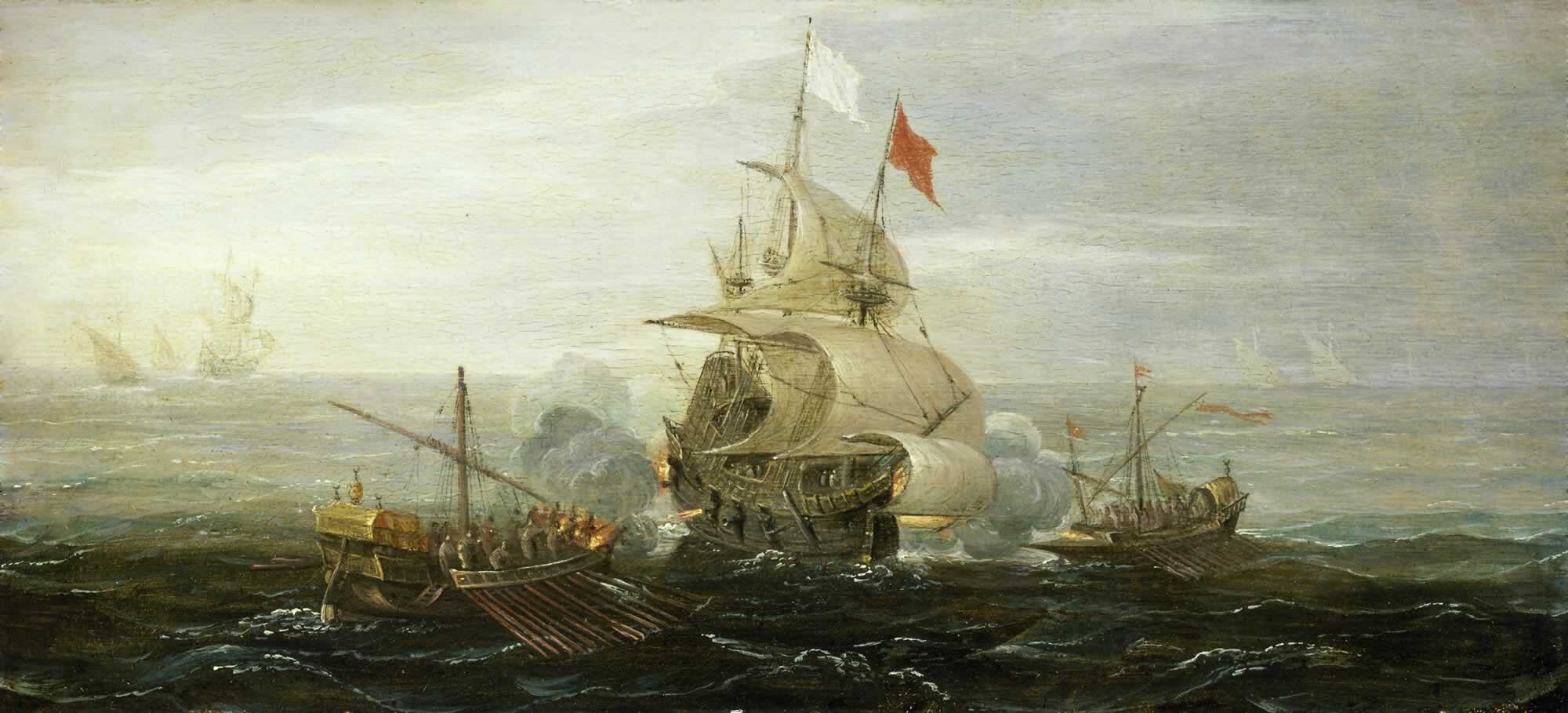THE BARBARY WARS.

A French Ship and Barbary Pirates, Aert Anthoniszoon, Public domain, via Wikimedia Commons
The Barbary Wars
The Barbary Corsairs were pirates who ruled the coasts of North Africa and carried out their operations through the ports of the Barbary states. The Barbary States, constituting Tunis, Algeria and Libya, practiced state supported piracy, to gain tributes from less powerful nations. Although the Barbary states were part of the Ottoman Empire, they were also independent states and free from the direct influence of Ottoman rule1. The western Mediterranean was primarily the stronghold of these pirates but at one point, such was their strength, that they were raiding some regions of the European coasts, including areas in Italy, France, Portugal, Spain and England. The purpose of carrying out the raids and attacks was to capture merchant ships and demand ransom and tributes2. The practice continued for centuries, until the 1800 Presidential election of Thomas Jefferson who, coming into power in 1801, refused to continue payments, and felt that money being paid out would be better spent on the building of a strong and powerful naval fleet, to protect US ships in the Mediterranean.
Thomas Jefferson (1743-1826) on engraving from 1835. American Founding Father, the principal author of the Declaration of Independence and third President during 1801–1809. Engraved by J.B.Forrest and published in National Portrait Gallery of Distinguished Americans Volume II, USA,1835.
The Tripolitan war commenced in 1801 and was the first of the two Barbary wars fought between the USA and the Barbary states. By the time Thomas Jefferson took charge as President of the USA in 1801, there were already deep seated tensions with the Barbary states, and especially with the Pasha of Tripoli who was demanding huge tribute amounts from the USA3.
It had become extremely difficult for the USA to make large tribute payments and run the country simultaneously, and as previously mentioned Jefferson's administration sought a long term solution, rather than the paying of annual tributes, which was a huge burden on the economy, it would spend money on enhanced protection, through the building of their naval fleet. Upon refusal of tribute payments, the Pasha of Tripoli went into war with the USA4.. The war continued in phases between the US navy and the pirates until a peace treaty was signed between the USA and Tripoli in 18055.
The success of the First Barbary War turned out to be beneficial for the USA, especially for its navy in terms of recognition of its strength to fight a war in far off shores of North Africa6. The United States memorialised many of the officers who served in the First Barbary Wars, such as Captain Thomas Macdounough, who was venerated for his service aboard the USS Constellation and the USS Philadelphia. However, the United State’s quest for peaceful and sustainable sea trade had not ended. In 1807, Algier along with Tripoli and Tunis, had once again begun attacking and capturing American merchant ships.
Thomas Macdonough (1783 - 1825)- who served with distinction in naval operations against Tripoli during the First Barbary War.
This continued until 1815, when the Americans finally decided to go into direct war with Algier and sent an entire fleet of ships to the region, and this began what is now known as the 2nd Barbary War. On arrival in Algier, the US naval expedition found that the state was under a new ruler, Dey Omar, who wished to stabilise years of political unrest7. A treaty was proposed and accepted, which led to the release of prisoners from both sides, and ended the paying of tributes, by the USA8. Treaties were also signed with Tripoli and Tunis, securing from Tripoli the release of all European captives.This began the end of piracy in the regions, although the Barbary states did continue with raids on the merchant ships of other nations, until the conquest of Algiers by the French, in 18309.
The USS Constellation, Captained by Thomas Macdonaugh during the Barbary Wars, at the Inner Harbor in Baltimore, Maryland.
FOOTNOTES.
Fremont-Barnes, Gregory The Wars of the Barbary Pirates, London: Osprey, 2006 page 20.
Davis, Robert. “History - British History in Depth: British Slaves on the Barbary Coast.” BBC. BBC, February 17, 2011. http://www.bbc.co.uk/history/british/empire_seapower/white_slaves_01.shtml.
U.S. Department of State. U.S. Department of State. Acchttps://history.state.gov/milestones/1801-1829/barbary-warsessed January 11, 2021.
ibid.
ibid.
Tucker, 2005, p. 464.
U.S. Department of State. U.S. Department of State. Accessed January 11, 2021. https://history.state.gov/milestones/1801-1829/barbary-wars.
ibid.
ibid.



